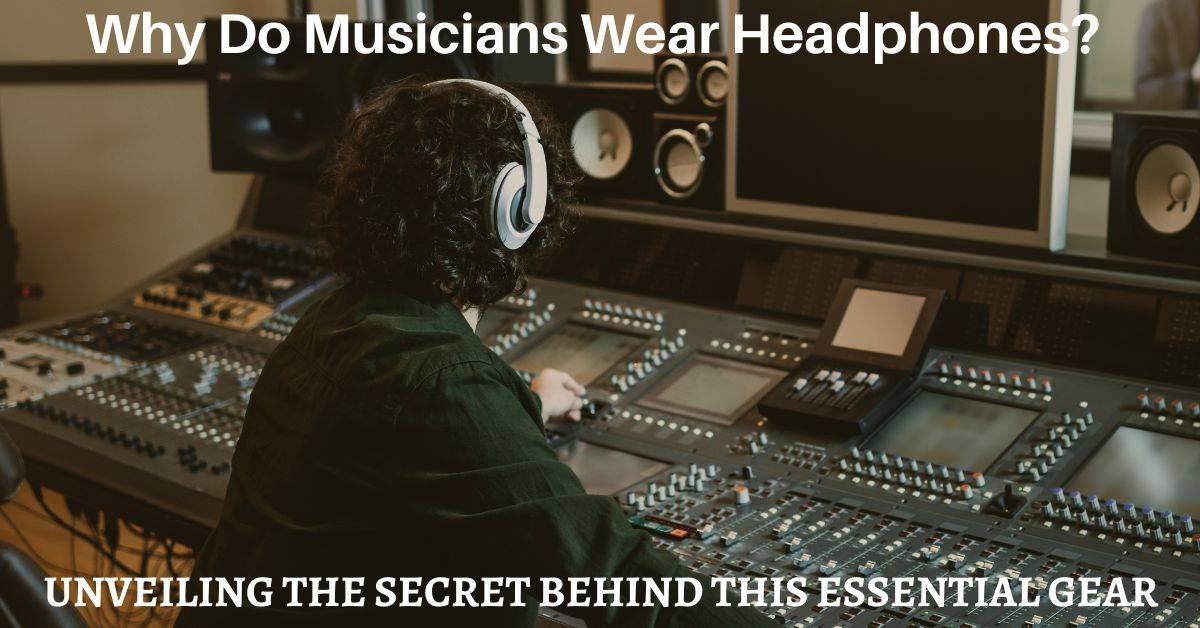In the world of music, there are countless tools and accessories that musicians utilize to enhance their performances and create captivating melodies. Among these essential gears, one intriguing item that often catches our attention is the humble pair of headphones. You may have wondered why musicians wear headphones during their live performances or studio sessions. What purpose do these seemingly ordinary devices serve? Join us on a journey as we unravel the secret behind why musicians wear headphones and explore their significance in the realm of music creation.
Achieving Optimal Sound Monitoring
The primary reason why musicians wear headphones is to achieve optimal sound monitoring. By donning a pair of high-quality headphones, artists can hear themselves and their fellow musicians with exceptional clarity. This is particularly crucial in live performances or recording studios where external noise and distractions can interfere with the music.
Headphones act as a personal monitoring system, allowing musicians to focus on their individual performances while maintaining synchronization with the rest of the ensemble. They enable artists to hear every nuance, from subtle instrumental details to delicate vocal harmonies, ensuring a seamless and cohesive musical experience.
When musicians wear headphones, they can control the balance between their own instrument or vocals and the accompanying music. This enables them to adjust their volume levels accordingly, ensuring that they can hear themselves without overpowering the overall sound. By achieving a well-balanced monitoring mix, musicians can deliver their best performances, expressing their musicality with precision and confidence.
Additionally, headphones provide isolation from external noise, creating a controlled sonic environment for the musician. This is especially beneficial in loud concert settings or bustling recording studios where ambient sounds can be distracting. With headphones, musicians can block out unwanted noise and focus solely on their performance, allowing for enhanced concentration and artistic expression.
In recording studios, headphones serve a crucial role in the production process. Musicians can listen to playback through headphones, ensuring that their recorded performances meet their desired artistic vision. By critically assessing their recorded tracks through headphones, musicians can identify any imperfections or areas for improvement, enabling them to refine their performances and achieve the desired level of excellence.
Precise Pitch and Timing Control
When it comes to musical performances, precision is key. Musicians rely on headphones to gain precise control over their pitch and timing. By wearing headphones, they can hear the backing tracks, click tracks, or metronome beats that guide them throughout the song. This helps them stay in perfect sync with the rhythm and maintain consistent timing, whether they are playing an instrument or singing.
Headphones also aid in achieving accurate pitch control. They allow musicians to hear their own vocals or instrumental parts more clearly, enabling them to fine-tune their pitch and intonation as they perform. This attention to detail elevates the overall quality of the music and enhances the listener’s experience.
Headphones provide musicians with a clear and direct audio feed that enables them to closely monitor the tempo and rhythm of the music. This is particularly important when multiple musicians are performing together, as it ensures that everyone stays synchronized and maintains a cohesive musical flow.
In recording studios, headphones play a crucial role in achieving precise pitch control. Musicians can hear their own vocals or instrumental parts more clearly, allowing them to fine-tune their pitch, intonation, and tonal quality. This heightened auditory feedback empowers musicians to deliver their performances with exceptional accuracy and expression.
Furthermore, headphones facilitate the process of recording multiple tracks and layering different musical elements. Musicians can listen to previously recorded parts through their headphones while recording new ones, ensuring perfect alignment and harmony between different sections of the composition. This meticulous attention to pitch and timing creates a polished and professional sound.
For vocalists, headphones are especially beneficial in monitoring their own singing. They can hear their voice in real time and make adjustments to their technique, breath control, and vocal dynamics. This level of precision allows them to deliver captivating performances with flawless pitch and control over their vocal expression.
Noise Isolation for Concentration
In a world filled with distractions, musicians often find solace in the immersive experience provided by headphones. By wearing headphones, they can block out external noise and immerse themselves fully in the music they are creating. This noise isolation allows them to concentrate on their performance, delve deeper into the emotional aspects of the music, and deliver a more captivating rendition.
Whether it’s a bustling live concert venue or a busy recording studio, headphones serve as a barrier between the musician and the outside world, allowing them to enter a realm where they can fully connect with their art. This focused environment nurtures creativity and enables musicians to give their best performances.
By shutting out extraneous sounds, headphones create a sonic cocoon for musicians, enabling them to hear their instrument or vocals with clarity and detail. This heightened auditory focus allows them to detect subtleties in their playing or singing that might otherwise go unnoticed. Whether it’s the delicate nuances of a guitar riff or the precise articulation of a vocalist, headphones provide a controlled listening experience that enhances musicians’ ability to express themselves authentically.
Moreover, the ability to isolate one from surrounding noise is particularly valuable during rehearsals or practice sessions. Musicians can wear headphones to block out external distractions and fully immerse themselves in their own playing or singing. This enables them to concentrate on refining their technique, experimenting with new musical ideas, and honing their skills without interruptions.
In the realm of recording, headphones play a critical role in achieving clean and isolated audio tracks. They prevent sound leakage from the monitoring system into the microphones, ensuring that each instrument or vocal is captured with clarity and minimal interference. This meticulous attention to noise isolation during the recording process results in high-quality, professional-grade recordings.
Furthermore, noise isolation provided by headphones enhances the listening experience for musicians during the post-production and mixing stages. They can critically assess individual tracks, make precise adjustments to the sound balance, and apply effects or enhancements without external distractions affecting their judgment. This meticulous control over the sonic environment contributes to the creation of well-crafted and captivating musical productions.
Enhanced Communication and Collaboration
Collaboration is an integral part of the music-making process. Musicians often work together in bands, orchestras, or studio settings where effective communication is vital. Headphones facilitate this communication by enabling musicians to listen to each other’s performances with precision.
In a recording studio, for example, each musician can wear headphones connected to a central audio mixing console. This setup allows them to hear the mix as it is being created and make real-time adjustments to their performances based on the overall sound. Through headphones, musicians can communicate with the audio engineer or producer, ensuring that their artistic vision is accurately translated into the final product.
When working in a band or ensemble, headphones with built-in communication systems become indispensable. These systems allow musicians to communicate with each other during live performances or rehearsals without the need for external microphones. This instant and clear communication ensure seamless coordination and synchronicity among the musicians, enabling them to deliver cohesive and captivating performances.
Furthermore, headphones enhance the collaborative process by enabling musicians to listen to reference tracks or previously recorded sections of the music. This allows them to align their performances with existing elements, ensuring that their contributions complement the overall arrangement. By closely listening to each other’s parts through headphones, musicians can refine their playing, make necessary adjustments, and create a harmonious blend of sounds.
Headphones also serve as a valuable tool for music producers and engineers during mixing and editing sessions. They can listen to individual tracks or isolated elements of a composition through headphones, focusing on specific details and nuances. This level of precision and control over the audio enables them to fine-tune the mix, apply effects, and make critical decisions that shape the final sound of the music.
Personalized Sound Experience
Every musician has unique preferences when it comes to their sound. Headphones provide musicians with a personalized sound experience tailored to their individual tastes. By using headphones, musicians can adjust the volume, equalization, and other sound parameters according to their specific requirements. This allows them to fine-tune their performances, highlighting the elements that are most important to them.
Moreover, certain genres of music, such as electronic or EDM, heavily rely on headphones for sound shaping and mixing. Musicians can hear the intricate details of synthesizers, drum beats and effects more precisely, enabling them to craft the desired sonic landscape.
For studio recordings, headphones play a vital role in achieving the desired sonic characteristics of a track. Musicians can listen to their own performances through headphones and make precise adjustments to capture the desired tonal qualities. This level of control allows them to shape the sound to fit the specific genre, style, or mood of the music being recorded.
Headphones also allow musicians to experience their music in a more intimate and immersive way. By isolating themselves from external sounds, they can fully immerse themselves in the music and connect with the emotions it evokes. This heightened auditory experience can inspire musicians to deliver performances filled with passion, expression, and authenticity.
Furthermore, the ability to personalize the sound experience extends to live performances. In situations where stage monitors may not provide optimal clarity, musicians can rely on their headphones to ensure they hear themselves accurately. This personalized monitoring enhances their ability to perform with confidence, especially in challenging acoustical environments.
Conclusion
Headphones play a crucial role in the world of musicians, offering a multitude of benefits that contribute to their performances and creative processes. Throughout this article, we have explored various reasons why musicians wear headphones and how they enhance their musical experiences.
Frequently Asked Questions
Q: Why do musicians wear headphones during live performances?
A: Musicians wear headphones during live performances to monitor their own performance and stay in sync with the rest of the band or ensemble. This helps them maintain accurate timing, pitch, and overall cohesion in their music.
Q: Do headphones help musicians improve their pitch?
A: Yes, headphones provide musicians with a clear and isolated audio feed, allowing them to hear their own vocals or instrument with precision. This enables them to fine-tune their pitch, intonation, and tonal quality, leading to improved overall performance.
Q: Are headphones important in recording studios?
A: Absolutely. Headphones are essential in recording studios as they allow musicians to closely monitor their own performances and ensure high-quality recordings. They help prevent sound leakage and enable musicians to hear themselves and the accompanying tracks with clarity and accuracy.
Q: How do headphones enhance communication among musicians?
A: Headphones with built-in communication systems enable musicians to communicate with each other during live performances or rehearsals without the need for external microphones. This instant and clear communication facilitate coordination, synchronization, and seamless collaboration among musicians.
Q: Can headphones provide a personalized sound experience for musicians?
A: Yes, headphones offer musicians the ability to personalize their sound experience by adjusting volume levels, exploring different sonic perspectives, and fine-tuning their instrument or vocal tones. This customization allows musicians to create a sound that aligns with their artistic vision.
Q: Are headphones useful for concentration during practice sessions?
A: Absolutely. Headphones provide noise isolation, allowing musicians to block out external distractions and concentrate fully on their playing or singing. This focused environment enhances practice sessions, enabling musicians to refine their technique and explore musical ideas without interruptions.
Q: Do headphones contribute to a better overall musical experience?
A: Yes, headphones contribute to a better overall musical experience by providing precise monitoring, enhancing communication, offering personalized sound, and fostering concentration. They empower musicians to deliver exceptional performances, connect deeply with their music, and create captivating musical productions.

